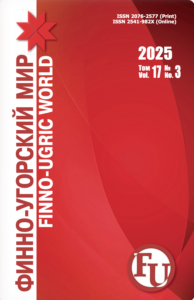Original article
https://doi.org/10.15507/2076-2577.017.2025.03.338-348
https://elibrary.ru/ublbwu
УДК / UDC 316.1(=511.1)
The Social and Existential Determinants of the Traditional Mari Mentality
V. G. Tokpulatov
Mari Research Institute of Language, Literature and History named after V. M. Vasiliev, Yoshkar-Ola, Russian Federation
Abstract
Introduction. Of current academic concern is the scarcity of research on Mari folklore, particularly proverbs, from the perspective of neoclassical determinism. The objective of this study is to identify and analyse the mechanisms and specific nature of the influence exerted by objective (external/social) and subjective (internal/existential) determinants on the formation and functioning of the traditional Mari mentality, as expressed within folklore texts.
Materials and Methods. The subject of this research comprises proverbs (kalaykmut) and ethnographic sources that reflect conceptions of the category of sociality and causality within Mari culture. The methodological foundation is constructed upon the theory of neoclassical determinism. This study employs methods of comparativism to juxtapose archaic and contemporary texts, hermeneutic analysis aimed at interpreting sacred meanings, and the method of generalisation to identify universal patterns within the folklore heritage.
Results and Discussion. Existential determinants, articulated through the concepts of ‘Yumo’ (deity) and ‘chon’ (soul), play a predominant role in the Mari mentality. Social conditions are mediated through spiritual practices, and the Mari worldview is characterized by properties of fractality and heterarchy, which indicates a recurrence of cultural patterns across different levels of being.
Conclusion. The obtained findings indicate the necessity of revising the classical conception of social determinism by incorporating the intrinsic freedom of the individual and the spiritual components of culture. The practical significance of the study is demonstrated by the potential application of its conclusions within the realms of ethno-cultural education and interdisciplinary research pertaining to Finno-Ugric peoples.
Keywords: determinism, ethnicity, Mari folklore, existentiality, social determination, cultural consciousness, traditional mentality
Conflict of interest: The author declares no conflict of interest.
For citation: Tokpulatov V.G. The Social and Existential Determinants of the Traditional Mari Mentality. Finno–Ugric World. 2025;17(3):338‒348. https://doi.org/10.15507/2076-2577.017.2025.03.338-348
REFERENCES
- Меnchikov G.P. On the Meaning of Human Life (Neoclassical Discourse). Psychophysiology News. 2023;(1):19‒28. (In Russ., abstract in Eng.) https://doi.org/10.34985/o2459-9602-0018-d
- Żuk P., Żuk P. Beyond “Geological Nature”, fatalistic determinism and Pop-Anthropocene: Social, Cultural, and Political Aspects of the Anthropocene. Earth’s Future. 2024;12(4):1‒10. https://doi.org/10.1029/2023EF004045
- Baumeister R.F., Lau S. Why Psychological Scientists should Disdain Determinism. Possibility Studies & Society. 2024;2(3):282–302. https://doi.org/10.1177/27538699241258002
- Müller T., Rumberg A., Wagner V. An Introduction to Real Possibilities, Indeterminism, and Free Will: Three Contingencies of the Debate. Synthese. 2019;196:1–10. https://doi.org/10.1007/s11229-018-1842-4
- Bhambra G.K. Connected Sociologies. London: Bloomsbury Academic; 2014. http://dx.doi.org/10.5040/9781472544377
- Venturini T., Jensen P., Latour B. Fill in the Gap. A New Alliance for Social and Natural Sciences. Journal of Artificial Societies and Social Simulation. 2015;18(2):18–29. https://doi.org/10.18564/jasss.2729
- Shkalina G.E. Epic Features of the Creation of the World in the Heroic Epic of the Mari People “Yugorno. The Song of the Prophetic Path”. Ethnic Culture. 2024;6(4):30–35. (In Russ., abstract in Eng.) https://doi.org/10.31483/r-113295
- Glukhova N.N. Leading Components of Ethnic Mentality in Mari Verbal Charms. Finno-Ugric World. 2019;11(4):374–390. (In Russ., abstract in Eng.) https://doi.org/10.15507/2076-2577.011.2019.04.374-390
- Popov N.S. To the Question of Formation and Development of Mari Traditional Religion. Finno-Ugric Studies. 2020;(61):148–157. (In Russ., abstract in Eng.) Available at: https://marnii.ru/zhurnal/vypuski/ (accessed 14.02.2025).
- Ilikaev А.S. Myths about Yumynudyr (“Heavenly Maiden”) in Mari Mythology and Ritual: An Attempt at a Source and Structural Analysis. History magazine: researches. 2024;(6):275–294. (In Russ., abstract in Eng.) https://doi.org/10.7256/2454-0609.2024.6.72829
- Alybina T. Contemporary Mari Belief: The Formation of Ethnic Religion. Journal of Ethnology and Folkloristics. 2018;12(2):95–114. https://doi.org/10.2478/jef-2018-0013
- Berezina A.V. Ethnocultural Identity of the Mari People in the Virtual World. KnE Social Sciences. 2022;53–60. https://doi.org/10.18502/kss.v7i2.10275
- Ustyantsev H.Yu. Bogatyrs and Rulers: Folklore Characters in the Ethnic Identity and Religious Practices of the Vyatka Mari. RUDN Journal of Russian History. 2023;22(4):532–545. (In Russ., abstract in Eng.) https://doi.org/10.22363/2312-8674-2023-22-4-532-545
- Millican P. Hume’s Determinism. Canadian Journal of Philosophy. 2010;40(4):611–642. https://doi.org/10.1080/00455091.2010.10716737
- Меnchikov G.P. [The Essence of Will]. Psychophysiology News. 2015;(4):106‒109. (In Russ.) https://elibrary.ru/vbcqtp
Information about the author:
Vladimir G. Tokpulatov, Cand.Sci. (Philos.), Senior Researcher of the Scientific Field “Ethnology”, Mari Research Institute of Language, Literature and History named after V. M. Vasiliev (44 Krasnoarmeyskaya St., Yoshkar-Ola 424036, Russian Federation), ORCID: https://orcid.org/0009-0006-0249-3242, SPIN-code: 4620-1789, vladimir.tokpulatov@ya.ru
The author has read and approved the final manuscript.
Submitted 31.03.2025; revised 21.04.2025; accepted 28.04.2025.






















